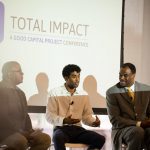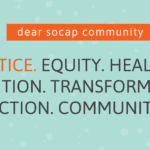Sarah Fritschner - Cheap Food: Scale, Impact and What Will Make a Difference?
Today’s plenary highlighted gaps in the impact investing movement as well as ways to cross the chasm: new frames such as the surprise social entrepreneur, steps to continue to move innovative finance forward, the business solution to poverty, understanding how to build robust food systems, and finally, blowing the Shofar in support of the Jewish holidays.
Food for thought from this session:
1) Laura Callanan, Scholar-in-Residence at UC Berkeley’s Haas, sees artists in the role of today’s surprise entrepreneur. Creativity and innovation are intricately linked. Artists have an essential role in the growth of social innovation.
2) Zia Khan with the Rockefeller Foundation addressed the reality that the impact investing field is still in its infancy with more talk than action. Social capital markets are still crossing the chasm of adoption, and the early majority adopters have not arrived. Three areas for improvement include: aligning impact investors around social challenges, new management practices, and rethinking paradigms to achieve big scale.
3) Paul Polak of Windhorse International discussed what is needed to reach the 2.7 billion people living on less than $2 a day – representing 40% of the world population and an unparalleled opportunity for new markets and transformational social change transforming business as usual. Today, both public- and market-based approaches in the war against poverty have failed. Conventional aid has failed because one cannot donate people out of poverty. The era of big business continues to be dependent on the troubling pattern of overconsumption that originally led to the recession. The social impact movement has not demonstrated commercial profitability with scale. A new breed of frontier multinationals is needed to overcome these challenges.
4) Mary Berry with The Berry Center discussed the systemic agricultural challenges facing her hometown of Louisville – a story being repeated in farms everywhere. She points out that though agriculture must be productive, it is not the only requirement of farming. Robust food systems must also preserve the fertility and ecological health of land. Robust food systems require people to be highly motivated with the time and knowledge to use the land well. Agriculture in its present state fails to meet these requirements.
Sarah Fritschner of Louisville Farm to Table roused the crowd with several stories of her experiences as food activist. Changing local food system means creating a way for people to make a living by growing, processing, and distributing foods. A robust food system lifts all boats. Agriculture today – through institutional players and government subsidies – does not adequately support local food.
5) SOCAP honored Rosh Hashanah by inviting Rabbi Yosef Langer (Chabad of San Francisco) to share wisdom, stories, and inspiration and blow the shofar.
Special SOCAP13 Volunteer Post by Grace Chang



